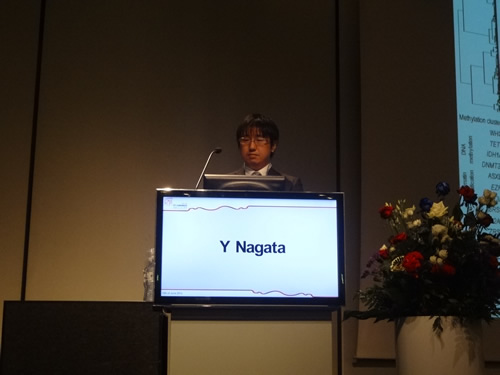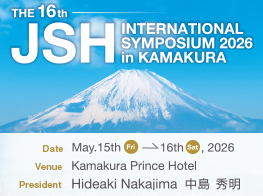
名前:永田安伸 【京都大学医学研究科 腫瘍生物学】
発表日時:2014年6月14日
発表形式:Oral
Title:
Molecular profiling of 944 patients with myelodysplastic syndromes using deep sequencing
Authors:
Yasunobu Nagata1,2, Vera Grossmann3, Yusuke Okuno2, Ulrike Bacher3, Genta Nagae4, Susanne Schnittger3, Yusuke Shiozawa1,2, Ayana Kon1,2, Tamara Alpermann3, Kenichi Yoshida1,2, Masashi Sanada1,2, Andreas Roller3, Niroshan Nadarajah3, Yuichi Shiraishi5, Kenichi Chiba6, Hiroko Tanaka6, H.Phillip Koeffler7,8, Hans-Ulrich Klein9, Martin Dugas9, Alexander Kohlmann3, Satoru Miyano5,6, Claudia Haferlach3, Hiroyuki Aburatani4, Wolfgang Kern3,Torsten Haferlach3, Seishi Ogawa1,2
Affiliations:
1Department of Pathology and Tumor Biology, Kyoto University, Kyoto, Japan. 2Cancer Genomics Project, Gr¬aduate School of Medicine, The University of Tokyo, Tokyo, Japan; 3MLL Munich Leukemia Laboratory, Munich, Germany; 4Genome Science Division, Research Center for Advanced Science and Technology, The University of Tokyo, Tokyo, Japan; 5Laboratory of Sequence Data Analysis, Human Genome Center, 6Laboratory of DNA Information Analysis, Institute of Medical Science, The University of Tokyo, Tokyo, Japan; 7Hematology/Oncology, Cedars-Sinai Medical Center; 8National University of Singapore, Cancer Science Institute of Singapore, 9Department of Medical Informatics and Biomathematics, University of Munster, Munster, Germany
Abstract:
BACKGROUND
Myelodysplastic syndromes (MDS) are a heterogeneous group of chronic myeloid neoplasms characterized by varying degrees of cytopenias and a high propensity to acute myeloid leukemia. Diagnosis and prognostication of MDS may be improved by High-throughput mutation/copy number profiling, which also provide a new insight into their pathogenesis.
AIM
The purpose of this study is to investigate the role of gene mutations in the pathogenesis/clonal evolution of MDS and their impact on prognostication in MDS.
METHODS
A total of 944 patients with various MDS subtypes were screened for gene mutations and deletions in 104 known/putative genes relevant to MDS using targeted deep-sequencing and/or array-based genomic hybridization. Somatic mutations were identified through in-house pipeline, correlations of different gene mutations and their clonal architecture were investigated. Impact of genetic lesions on overall survival (OS) was investigated by univariate analysis and a conventional Cox regression to build a new prognostic model based on gene mutations.
RESULTS
After excluding sequencing/mapping errors and known or possible polymorphisms, a total of 2,764 single nucleotide variants and insertions/deletions were detected in 96 genes as high-probability somatic changes. A total of 47 genes were considered as statistically significantly mutated (q<0.01), of which only 6 genes (TET2, SF3B1, ASXL1, SRSF2, DNMT3A, and RUNX1) were mutated in >10% of the cases.
Significant correlations were observed for different gene mutations, particular combinations of gene mutations occurred more frequently than expected, suggesting the presence of functional interactions between these mutations. Intratumor heterogeneity was evident in as many as 456 cases (48.3%), even though the small number of gene mutations available for evaluation was thought substantially to underestimate the real frequency. The number of observed intratumoral subpopulations tended to correlate with the number of detected mutations and therefore, advanced WHO subtypes and risk groups with poorer prognosis. Mean variant allele frequencies (VAFs) showed significant variations among major gene targets and VAF values were significantly biased for some combinations of genes, suggesting the presence of chronogenic hierarchy among these common mutations during clonal evolution in MDS.
The impact of these genetic lesions on clinical outcomes was initially investigated in 875 patients. In univariate analysis, 25 out of 48 genes tested significantly affected overall survival (p < 0.05), and only SF3B1 mutations were associated with a better clinical outcome. Importantly, the impact on survival was observed even for subclonal mutations. Finally, to evaluate the combined effect of these multiple gene mutations/deletions, together with common clinical/cytogenetic variables used for IPSS-R, OS was modeled by a Cox regression. We found that when combined with traditional prognostic valuables, such as age, white cell counts, hemoglobin, platelet counts, cytogenetic score in IPSS-R, the mutation/deletion status of a set of genes could be used to build a prognostic system more accurately predict the survival of patients.
CONCLUSIONS
Large-scale genetic and molecular profiling using deep sequencing not only provided novel insights into the pathogenesis and clonal evolution of MDS, but also enabled to build a more robust prognostic model based on both gene mutations and other clinical variables that could potentially outperform the conventional prognostic systems.
EHA2014に参加した感想
今回、栄えあるEHA Travel Awardを受賞させて頂きありがとうございました。2014年6月12日-15日、イタリア、ミラノで開催されました19th Congress of EHAに参加させて頂きましたのでご報告いたします。6月は日本に比べて非常に過ごしやすい気候と聞いていたのですが、実際にミラノに到着後は30℃を超える真夏日が連日続き、欧米人もあまりの異常気象にかなり驚いていました。街ゆく人はラテン民族ということで非常に陽気であり、サッカーワールドカップ期間と重複しておりましたので、ザッケローニ監督、長友や本田といったミラノのチームに所属する日本人選手に関する話で大いに盛り上がりました。学会場へは連日電車での移動であり、駅から徒歩10分で会場のMilano Congressiに到着します。初めて会場を見た時には銀色の複雑な流線型のオブジェが会場の屋根全体を覆うように配置され、その奇抜かつファッショナブルな外観に心を奪われました。内装にはビビッドカラーの椅子が配置され、ミラノはファッションの街であることを再認識させられました。
6/13(金)の教育講演では米国のBenjamin Ebert先生がメチル化阻害剤の治療効果と遺伝学的異常との関連について発表されており、非常に興味深い内容で感銘を受けました。TET2変異症例ではメチル化阻害剤の治療効果が高く、その影響はASXL1変異の有無でさらに層別化されることが示されておりました。これらのエピゲノムに関わる遺伝子異常を同定することで、治療効果の予測により最適化された治療を行うことが可能となり、結果として予後の改善が期待され得るすばらしい結果と考えました。また造血幹細胞移植前の遺伝子異常の有無で移植後の予後予測を行う研究も報告されており、TP53変異例では移植後もきわめて予後不良でした。また、複雑染色体異常は最も予後不良の特徴の一つですが、近年これらを有する群内においてもTP53変異の有無により予後が層別化できる可能性が示唆されております。これらを踏まえますと、今後クリニカルシークエンスの有益性がますます高まることが想定され、非常に刺激を受けました。
私自身はこれまで骨髄異形成症候群における網羅的遺伝子変異解析の研究に携わって参りました。本学会では、6/14(土)午前中の「Myelodysplastic syndromes - Biology」というセッションでoral発表をさせて頂きました。近年の次世代シークエンス技術の発展より明らかとなったスプライシングやコヒーシンなどの遺伝学的異常に着目し、多数症例で網羅的な解析を行い臨床情報との比較により、IPSSなど従来のモデルを上回る新たな予後予測モデルを構築できたことを示しました。また、メチル化パターンによる階層クラスタリング解析にてメチル化グループとSF3B1やTET2など遺伝子変異との相関関係が認められ、メチル化の程度が有意差を持って予後に影響を及ぼすことを報告しました。質疑応答ではメチル化に関する質問が集中し、スウェーデンのEva Hellstrom-Lindberg先生と活発な議論を行い貴重な意見を得ることができました。このような大規模な海外学会での発表を行うことで有識者と積極的な意見交換や情報共有が可能となり、研究を強力に推し進めることを強く実感致しました。
また、6/14(土)にはTravel Award受賞者の先生方と会食の機会を頂きました。同世代の先生方が造血器に関わる様々な領域で研鑽を積んでおられ、率直な意見交換ができましたことは大変自分の励みになりました。最後になりますが、常日頃粘り強く研究に関するご指導を頂いております京都大学医学研究科腫瘍生物学の小川誠司教授、このようなすばらしい機会を頂きました日本血液学会事務局・国際委員の諸先生方に心より感謝申し上げます。




